Education is important, but the path to education is changing rapidly. Getting a degree may still be important, but in the 21st Century economy it’s not the gold standard it used to be.
You’ll need to keep learning for the rest of your life in order to keep up. You may even have to change careers multiple times over the course of your life. Unfortunately, for most people who work, dropping everything to go back to school is not a viable option.

The good news is that you no longer have to put your life on hold (or empty your bank account) to get a college-level education. Thanks to the open education movement and advances in eLearning, you can take free online college courses from the comfort of your home. Many of these are often free!
The following are ten of the best, free online college course websites. Be aware that some of these sites also host paid courses or paid add-ons, but you’ll find plenty of free courses to elevate your knowledge to the next level.
A Note on Assessment and Accreditation
One important thing to mention before we get to the actual free online college course websites is accreditation and assessment. There are three components to a college course. The first is course material. The second is assessment of your knowledge. The third is the school’s accreditation.
With online courses, these three components are usually separate. Most often, the course content is free. This is perfect for someone who wants to learn something new. The assessment of your knowledge, when offered, is often also free. You’ll either complete a computerized exam or have your work graded.

Accreditation is a different story. This is the process through which an institution certifies your assessment and gives you formal credit for knowledge gained. Depending on the nature of the accreditation, you can usually use it to get a job, gain college credit or some other formal purpose.
Where accreditation is offered, it usually carries a price tag. Most people looking to learn online don’t need accreditation, but if that’s what you’re ultimately after, this is one thing you won’t get for free.
MIT OpenCourseWare
MIT OpenCourseWare is special for a few reasons, but the most important is that it’s the pioneering project that kickstarted free college-level education on the web. Back in 2001, MIT made the decision to publish all of their course material online, for free.
Using the Creative Commons licence framework, students and educators can read, modify and reuse learning content from one of the most elite educational institutions in the world.
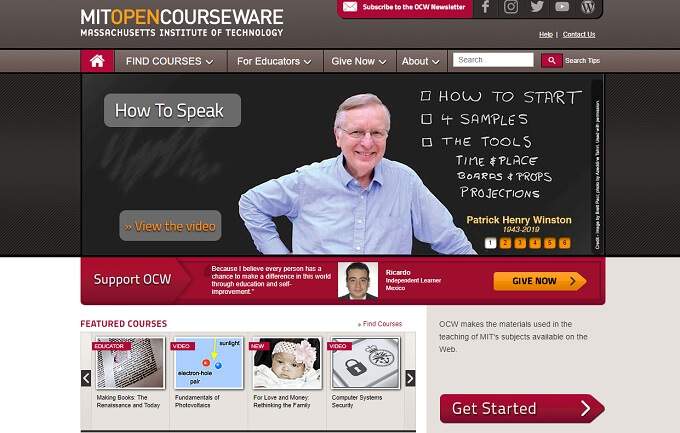
Given MIT’s reputation and technological specialization, you’d be right to expect many amazing courses in areas such as Computer Science and Engineering. However, they also have free online college courses in humanities subjects, such as linguistics, philosophy and even gender studies.
Unlike many of the sites below, MIT OpenCourseWare is solely focused on content. You don’t actually get to “take” these courses. Rather, you can download all the course material and go through it yourself. Sometimes this includes assignments with answers, and for some more recent courses it also includes video recordings of lectures.
If you want to see what makes MIT special and are interested in their specialized subject areas, MIT Opencourseware is an essential resource. However, if you want something a little more interactive, then let’s move on to the other worthy contenders on this list.
Coursera
Coursera is one of the early MOOC pioneers. That is, Massive Open Online Courses. It was started by two ex-Stanford professors back in 2012 and today hosts content from universities such as Princeton, Duke and Stanford. To name but a few.
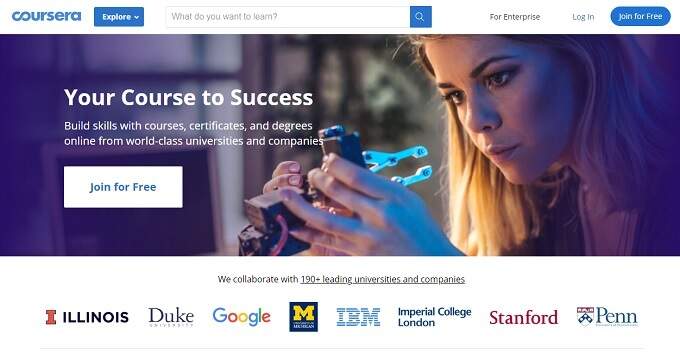
If you are willing to pay the fee, you can get an accredited certificate or even a degree! However, for no money at all you can learn some of the most relevant skills in modern life here. Coursera is especially valuable for learning about hot, new in-demand skills and fields.
The free online college courses here are usually self-paced and put together by some of the best educators in the world. You can get a certificate of completion for some courses, such as this one.
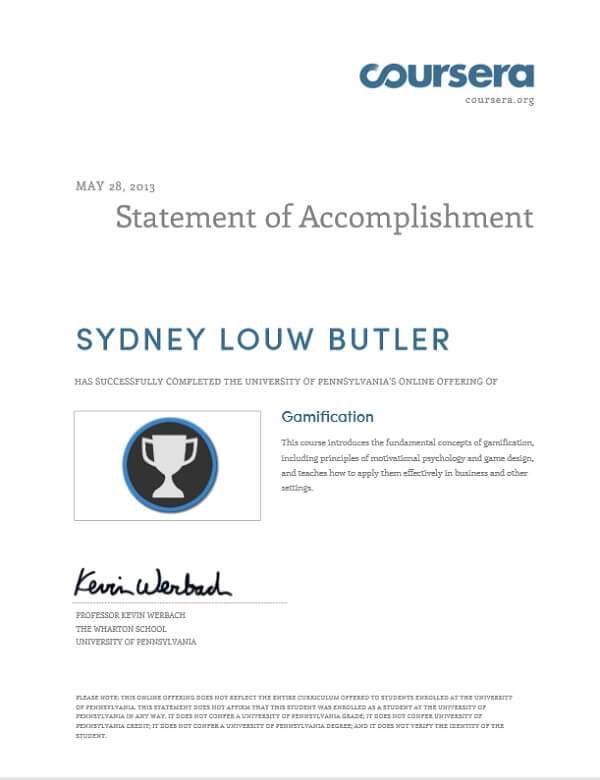
Of course, it’s not accredited, but that might not matter to your employer or whomever else you want to show that you’ve put effort into learning something new.
edX
Like Coursera, edX is a pioneer of the MOOC revolution. Launching in 2012. The site is a joint venture by Harvard University and MIT. However, free online college course material on edX comes from a large variety of respected institutions.

There are college-level courses in just about any subject area that you can imagine, including hard-hitters such as engineering and medicine. The quality of the courses are exceptional, with plenty of self-paced offerings on the menu.
While taking a course is free, you can receive a “verified certificate” for a fee. This can be used as evidence that you’ve passed an assessment and that you were the person who completed the test. Although this does not count as any sort of official accreditation, you can include it with job applications or any other relevant applications to show you’ve done the work.
Khan Academy
Khan Academy started off as a way for Salman Khan to help family members understand their math homework. Today it’s one of the best educational resources on the internet.
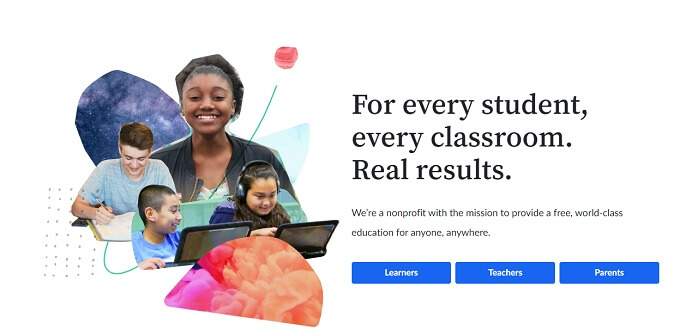
While the majority of topics covered here cover the school years before college, there are college prep and college level material here as well. It’s also an excellent way to brush up on things like high school mathematics. This is helpful if you want to enroll in college later in life and are a bit hazy on your school days. According to their official documentation, their coursework covers all of K12 and “early” college.
Everything on the site is free, and the creators have created one of the most intuitive systems to gauge your current level, and guide you along a learning path suited to your needs. This is especially helpful in tough subject areas such as mathematics.
Udemy
Udemy was founded all the way back in 2009 and has simply gone from strength to strength in the world of online learning. The key innovation of Udemy is that it makes it relatively easy for anyone with something to teach to create a course. If you’re an expert who can transfer your skills to others, then Udemy is a great place to do that while earning some money.
Yes, many of the courses on Udemy do attract a fee, but there are also hundreds and hundreds of excellent free online college courses on the platform. Often, instructors will make their introductory courses free, only charging money for intermediate and advanced levels. Which means that you can freely learn the fundamentals of various subjects.
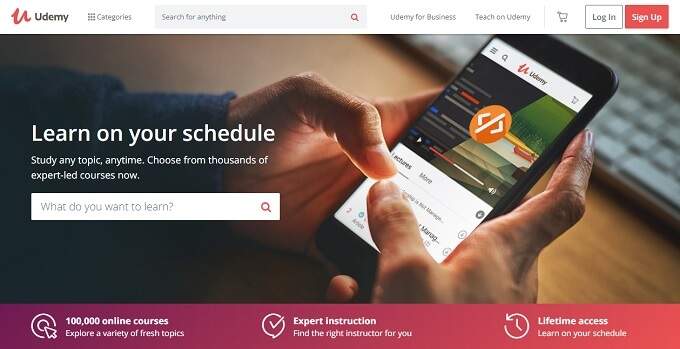
While these courses are generally not meant to be the equivalent of college course modules, many of them are taught by retired faculty or professionals in those fields. So it’s a good way to gain skills and knowledge from a field directly in a less formal way.
On the other hand, Udemy does not have stringent curation standards compared to the likes of edX or Coursera, so you’ll always have to approach any courses offered on the site with a critical eye. We also think that Udemy has one of the most user-friendly, polished mobile apps of any online education site today. It’s well worth a visit!
Udacity
Not to be confused with the similarly-named Udemy, Udacity was famously founded by Sebastian Thrun and remains a key player in the world of online education. When Udacity was first launched, it focused on replicating college courses, but as competition in this sector had heated up, Udacity has evolved into a more vocational, skills-focused platform.
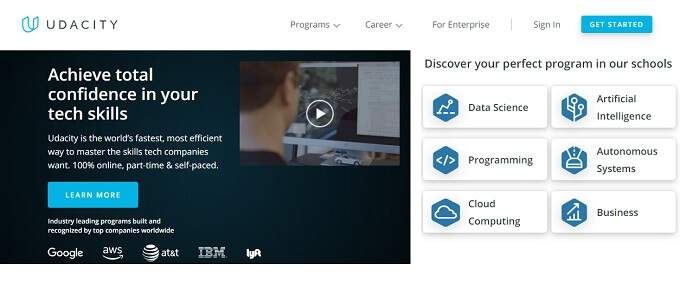
There are plenty of excellent free online college courses on Udacity, but if you’re willing to pay you can enroll for Udacity’s innovative “nanodegree” programs, which are built up from various smaller courses and come with a formal accreditation, so you can use them to apply for jobs and other formal purposes.
Udacity’s courses aren’t self-paced, and you need to enroll and start along with everyone else. That being said, there’s an extensive archive of past free courses to audit. The knowledge is there for the taking!
Open Education by Blackboard
Blackboard is one of the world’s leading learning management system (LMS) providers and their Open Education site provides a platform for institutions to offer free courses. It’s a pretty barebones site, but using it proves to be just as simple.
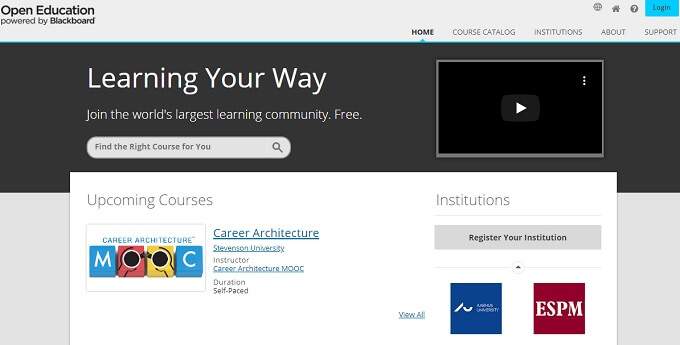
All you need to do is either enter a search term or browse the course catalog using various filters. This includes searching by institution, subject area and language of instruction.
The platform is a little slow, but Blackboard itself is a very solid LMS and there are plenty of very useful courses in the catalog which you can take to your heart’s content for no money at all.
OpenLearn
OpenLearn is the Open University’s best-known Open Learning Resource project. It’s also one of the oldest open learning resources on the web, dating back to 1999. Long before the MOOC revolution, driven by sites such as Coursera or edX.
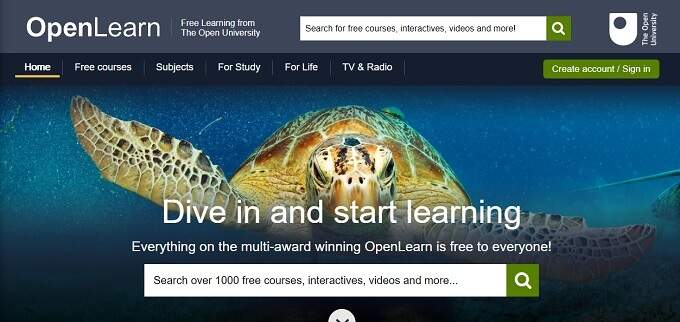
OpenLearn has an absolute mountain of resources for those in the education industry, but the part that’s of interest to frugal students with a desire to learn is the catalogue of free online college courses on offer. These cover just about every subject area you can imagine, with courses clearly marked in terms of their length and difficulty level.
Since these are a collection of open courses from various sources, the level of polish varies, but it’s a very user-friendly site to use and an essential learning resource.
Carnegie Mellon Open Learning Initiative
Carnegie Mellon is another world-famous university that’s thrown its hat into the open learning movement. However, not every course on this site is free. Luckily, the courses are clearly marked as “open & free” when applicable.
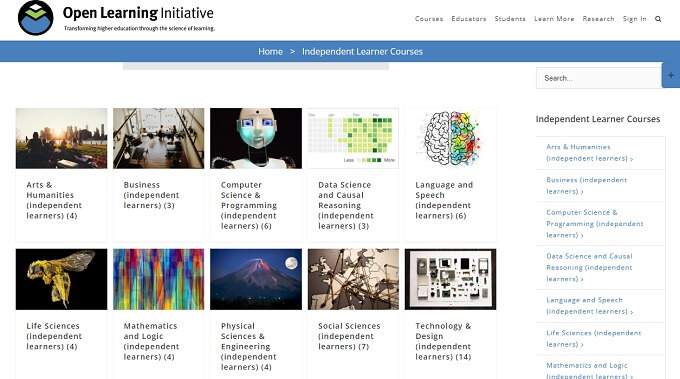
Even better, you don’t even have to sign up for an account in order to access course content. Although, of course, you can’t save any progress, settings or work if you don’t.
FutureLearn
Futurelearn is one of the most interesting entries on this list. It was created from the ground up to focus on MOOCs, rather than adapting existing college courses FutureLearn has been making MOOCs as a speciality.

The production quality and design of their courses are a cut above the competition. FutureLearn is partly owned by the Open University, but features courses contributed by well over 100 institutions.
FutureLearn is a little more commercialized, which makes sense since those glossy courses also cost quite a bit of money to make. The good news is that they charge a single annual subscription, which gives you access to hundreds of paid short courses. What we want however, are free courses and FutureLearn have handily lumped all of their free courses together into one catalogue.
Get Your Learn On!
The internet started life thanks to support from academia, so it’s only right that it can provide free education to millions of people all over the world today.
With these ten sites, you have access to what feels like the sum total of human knowledge, along with user communities and often access to expert educators. So do you really have an excuse not to up-skill yourself? The time to learn is now!